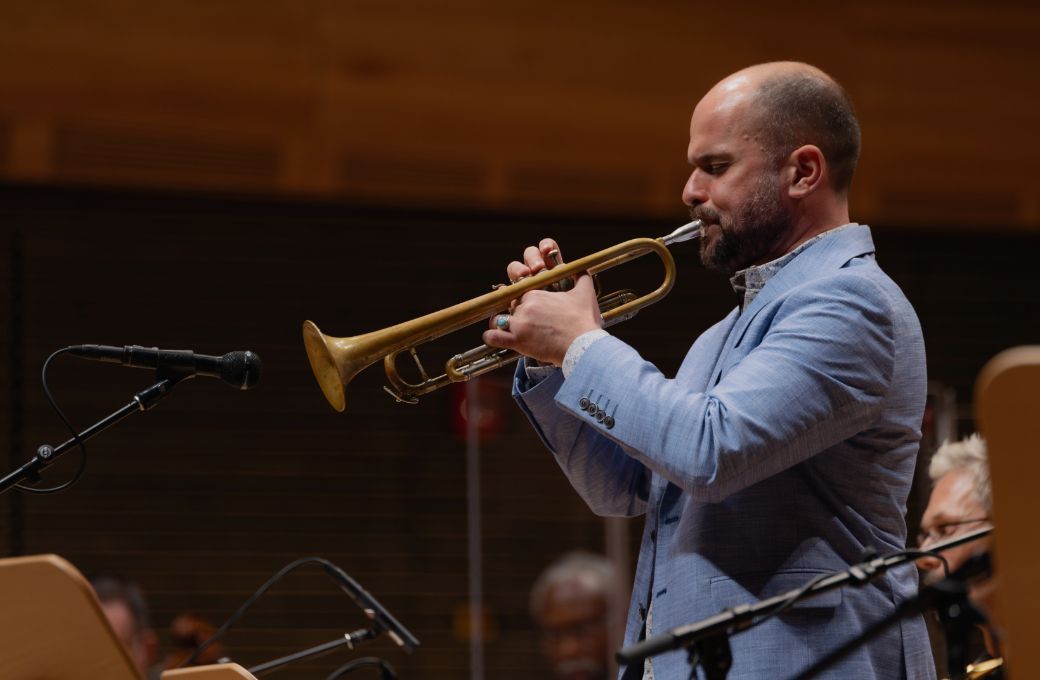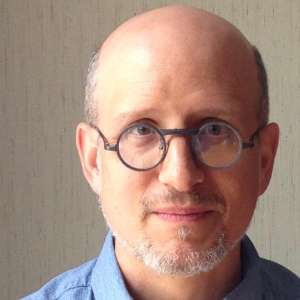This concert, the first of Louis Langrée’s farewell season with the Mostly Mozart Festival Orchestra and the orchestra’s first in the newly-renovated David Geffen Hall, paired the Mozart Mass in C minor with the world premiere of a substantial piece on the subject of remembrance by Iraqi-American composer Amir ElSaffar on the 20th anniversary of the US invasion of Iraq.

ElSaffar is best known as a jazz trumpeter with Iraqi Maqam and Western classical influences, and his piece, Dhikra (Remembrance), was scored for his band, the Two Rivers Ensemble, along with Maqam vocalist Hamid Al-Saadi and nine members of the MMFO. Al-Saadi and the band, consisting of Middle-Eastern fretted instruments oud and buzuq along with trumpet, tenor sax, bass and drums, began on stage, alongside two cellos. (ElSaffar also played the santur, similar to a hammer dulcimer.) The other orchestral instruments were arrayed along the balcony at first, joining the other musicians onstage partway through the nearly hour-long performance.
Dhikra (Remembrance) is ambitious artistically as it is durationally. Maqam-influenced trumpet and other instrumental writing were juxtaposed with atmospheric string and excitable woodwind textures and with straight-ahead composed jazz (reminiscent of late Charles Mingus) and jazz improvisation. Much of this was sectional, but sometimes the different sound worlds were layered, as at the piece’s outset, when gently buzzing strings accompanied a dusty-timbred trumpet solo that foreshadowed Al-Saadi’s contribution. His vocals, on texts of remembrance and loss, acted as a recurrent ritornello, gluing the work together.
The piece comes very close to succeeding in its ambitions. There was some structural awkwardness; the transitions into and out of the jazz sections were graceless, and there were a couple of false endings. There were also some strange choices; what was gained by having ElSaffar sing along with Al-Saadi for a few seemingly random passages? But it was as convincing an execution of the integration of different musical worlds as I’ve heard and it managed to pack an emotional wallop by the end. ElSaffar’s climactic solo, which combined heartbreaking lyrical lines and furious noisy low-register rumblings, had been fed by all that had come before, and summed up the sobbing laments of Al-Saadi’s traditional vocals, shedding new light on them.
Langrée and the MMFO are adept at teasing as much Mozartian essence as possible out of Baroque-flavored pieces like the Mass in C minor, and they did so appealingly here. However, the performance struck was uneven. Don’t get me wrong; the Mostly Mozart Festival Orchestra plays Mozart really, really well. But the Kyrie was too sluggish to be terrifying. The Hosanna in excelsis should be giddily gleeful, but struck me as plodding. While I am weepingly grateful for Langrée’s ability to get the orchestra out of the way of his soloists, he treated Malcolm J. Merriweather’s very fine Summer For the City Chorus as a section of the orchestra rather than an ensemble soloist in its own right, and the results were sometimes frustratingly jumbled.
The Mass really belongs to its female soloists, however. Soprano Erin Morley’s icy coloratura was particularly effective in the technically demanding Et incarnatus est, turning it into a glimpse of heaven. Mezzo Kate Lindsey was enjoyably theatrical in the Laudamus te and if some of her runs were slightly indistinct in the middle register, I forgave her for the thrilling touch of iron in her voice at full throttle. The ensemble solos didn’t cohere as much as one could wish for, but tenor Nicholas Phan and bass Jonathon Adams acquitted themselves professionally in their relatively ungrateful assignments completing vocal trios and quartets.


